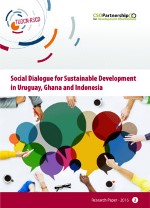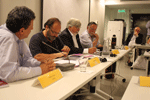Uruguay
|
Source: . Published on Wed, 2020-02-26 00:00
El mensaje no pudo haber sido más claro: “Nos enfrentamos a la amenaza muy real de una pandemia fulminante, sumamente mortífera, provocada por un patógeno respiratorio que podría matar de 50 a 80 millones de personas y liquidar casi 5% de la economía mundial. Una pandemia mundial de esa escala sería una catástrofe y desencadenaría caos, inestabilidad e inseguridad generalizadas”. |
|
Source: . Published on Sat, 2020-02-22 00:00
Apalancando la corrupción. En el acuerdo de culpabilidad que puso fin oficialmente al mayor caso de corrupción juzgado por los tribunales estadounidenses, la empresa constructora brasileña Odebrecht admitió haber pagado entre 2001 y 2016 “aproximadamente 778 millones de dólares en sobornos, en asociación con más de 100 proyectos en 12 países, incluyendo Angola, Argentina, Brasil, Colombia, República Dominicana, Ecuador, Guatemala, México, Mozambique, Panamá, Perú y Venezuela”. |
Published on Fri, 2017-02-03 09:20
TUDCN has undertaken three national case studies in Ghana, Indonesia and Uruguay to analyse social dialogue within the countries in its various forms, with particular focus on the formalisation of these dialogues at different administrative levels and its contribution to development. The studies are authored by national trade union specialists and include examples of good practice as well as of limitations of the different contexts. |
Published on Fri, 2014-04-04 10:40
Alternatives to austerity programs do exist, conclude civil society organizations and networks from around the world that met in Montevideo, convened by Social Watch to discuss strategies to face the multiple global crises. In the opening of our debates, the Uruguayan ministers of Interior, Eduardo Bonomi, of Labour, José Bayardi, and of Social Development, Daniel Olesker explained the way in which they managed to eradicate extreme poverty, reduce inequalities and grow at the same time. See the video here. (To see the English subtitles, press on the CC at the bottom right of the video). |
| Source: . Published on Thu, 2014-02-13 23:00 |
| Source: . Published on Tue, 2014-02-11 23:00 |
Published on Fri, 2013-09-13 17:24
The open panel on "Progress and Challenges on Tax Justice and Social Justice in Uruguay", put together by Development Alternatives with Women for a New Era (DAWN), Center of Concern, Social Watch and the Association for Women's Rights in Development (AWID) - all members of the Righting Finance Initiative - together with the International Council for Adult Education (ICAE) took place on Friday, August 16, 2013. Eduardo Brenta, Labour and Social Security Minister and Pablo Ferreri, Director of the Directorate-General for Taxation (DGI) discussed the impact of Uruguay tax and labor polices in terms of redistribution and the future challenges together with academics, feminist and human rights activists. |
| Source: . Published on Mon, 2011-10-17 17:37 |
|
Like other countries in Latin America, Uruguay was in a relatively good situation when the financial crisis of 2008 struck. The country’s economy continued to grow and its poverty and indigence rates improved considerably thanks to social policies, which in the more prosperous years had been given priority over macroeconomic objectives. Nevertheless, there are still problems to be tackled, such as high poverty and indigence rates among people of African descent and the fact that more and more heads of households at the very poorest level are women. To remedy these situations, combating inequities of gender and/or race should be an integral part of economic policy.
|
|
Source: . Published on Fri, 2010-08-13 00:00
» |
SUSCRIBE TO OUR NEWSLETTER










